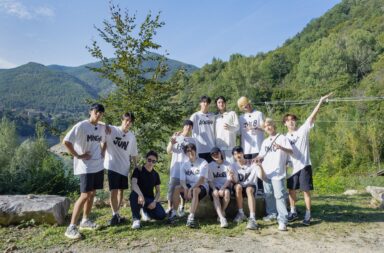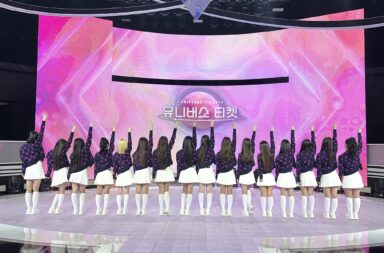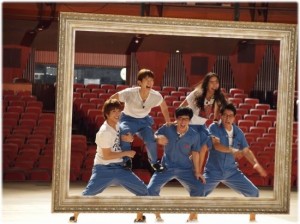 As we’ve discussed quite a number of times before, concepts are integral and extremely relevant in the very visual, idol-saturated K-pop industry. Concepts can often be considered the base or core thought of a comeback or debut; they’re a visual base for stylists and designers to expand on, a thematic base for composers and lyricists to (hopefully) consider, and a base of expectation for waiting fans. In terms of actual execution, in a way, concepts can also serve as guidelines for idols to follow, a basic set of instructions with lots of precedents to imitate, advising onstage behavior and mannerisms.
As we’ve discussed quite a number of times before, concepts are integral and extremely relevant in the very visual, idol-saturated K-pop industry. Concepts can often be considered the base or core thought of a comeback or debut; they’re a visual base for stylists and designers to expand on, a thematic base for composers and lyricists to (hopefully) consider, and a base of expectation for waiting fans. In terms of actual execution, in a way, concepts can also serve as guidelines for idols to follow, a basic set of instructions with lots of precedents to imitate, advising onstage behavior and mannerisms.
For example, a certain set of gestures and mannerisms is to be expected for a sexier concept, and another is expected for a cuter concept. The concept alone can tell how idols are supposed to behave on stage and how to perform in a way that sells the mood of their song. For a cuter concept, idols may use more animated mannerisms and more innocent faces, and little additions like winks can be timely added with the idol’s consideration. These behaviors may even carry out offstage to further sell the concept. Like for example, it would be much more fitting for idols to do more cutesy and playful fanservice during behind the scene cuts for a less serious comeback lest the effect of their performance be weakened.
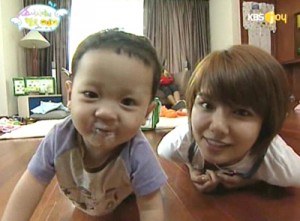 Much like their musical efforts, even the majority of idols’ variety shows center around a concept to follow. As we’ve covered before, idols often use variety as means of promotion for their marketing value, appearing as a guest in regular variety shows like Running Man or Invincible Youth 2 oftentimes near their promotion times. But as an alternative, some companies with more influence can choose to devote an entire show for their idols. But since only a few idols can really be close in being as amusing or entertaining as a real entertainer or gagman, concepts are used, not only to add some content, but to help set a main idea and track an overall progression of the show.
Much like their musical efforts, even the majority of idols’ variety shows center around a concept to follow. As we’ve covered before, idols often use variety as means of promotion for their marketing value, appearing as a guest in regular variety shows like Running Man or Invincible Youth 2 oftentimes near their promotion times. But as an alternative, some companies with more influence can choose to devote an entire show for their idols. But since only a few idols can really be close in being as amusing or entertaining as a real entertainer or gagman, concepts are used, not only to add some content, but to help set a main idea and track an overall progression of the show.
These concepts vary and are not limited to idol-based variety, but they are most evident in idol-based variety. If anyone has watched an idol-based variety before, the main charm of it would most likely be the member interaction, the group games, the fanservice and the like, but since it would be risky to fill an entire show out of that, concepts are established. Generally, as there can only be a limited and pre-planned number of episodes, these concepts allow the show to be filled with the said idols doing activities that revolve around the concept. While carefree member interaction and banter would still be present, with concepts present, there should always be some material to air. Concepts keep conversations between members as relevant as possible and serve as a reminder to help focus on the main purpose of the show, whatever that purpose may be.
 Just like how some musical concepts are popular and overused as they are easy to portray and very flexible to build on, there are a good number of variety concepts that remain staples for the same reasons. These concepts either proved to be successful before or allow much content to be filled up with related activities. Nevertheless, each concept has its own charms and guidelines that companies need to consider, as these concepts, when chosen right, can actually add to their idols’ stage concepts. But in turn, these concepts or variety in general can also take away from the idols’ original stage concept, making them hard to take seriously.
Just like how some musical concepts are popular and overused as they are easy to portray and very flexible to build on, there are a good number of variety concepts that remain staples for the same reasons. These concepts either proved to be successful before or allow much content to be filled up with related activities. Nevertheless, each concept has its own charms and guidelines that companies need to consider, as these concepts, when chosen right, can actually add to their idols’ stage concepts. But in turn, these concepts or variety in general can also take away from the idols’ original stage concept, making them hard to take seriously.
The first widely seen concept is one that centers around mimicking real life relationships, a la We Got Married (husband and wife) or Hello Baby (father/mother to child). These shows center around portraying idols living so-called “normal” roles outside of their celebrity one and provide an immense amount of fanservice to those curious of what kind of husband/wife or mother/father their biases would be. The relationship-like basis provides a clear and generally progressive flow, starting from the two parties meeting and ending with their separation. Under this definition, shows like Birth of a Family and SNSD‘s Girls’ Generation and Dangerous Boys, which feature owner/pet and mentor/mentee dynamics respectively, fall under this category as well.
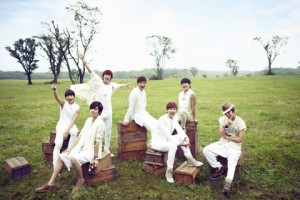 The charm of these shows for outsiders not necessarily in the fandom is to capture the bonding in between the meeting and separation and to reflect on how much the relationship have developed in the end — of course, with the at times irrelevant, albeit necessary, interaction fanservice smuggled in between. While most varieties attempt to separate idols from their idol status to varying results, these shows attempt to go beyond that in trying to make the idols as relatable as possible, filling content by making idols do regular (but oftentimes glamorized) chores or activities such as cleaning, shopping, and family outings (or dates).
The charm of these shows for outsiders not necessarily in the fandom is to capture the bonding in between the meeting and separation and to reflect on how much the relationship have developed in the end — of course, with the at times irrelevant, albeit necessary, interaction fanservice smuggled in between. While most varieties attempt to separate idols from their idol status to varying results, these shows attempt to go beyond that in trying to make the idols as relatable as possible, filling content by making idols do regular (but oftentimes glamorized) chores or activities such as cleaning, shopping, and family outings (or dates).
Another concept often used in media is competition. While small games and competitions are always present in almost all forms of variety, some shows center around one big competitions or themed weekly competitions. Infinite‘s recent Ranking King falls under this category, and while they’re not idol-based, shows like Running Man, Dream Team, Heroes, and Kim Yuna‘s Kiss and Cry focus on competition as well. While these shows aren’t necessarily the most successful in showing idols in a more relatable light, they focus on showcasing the idols’ more commendable character traits such as their willpower, sportsmanship, and resourcefulness, all while entertaining through enthralling yet amusing challenges. The progression of these competitions is basically self-explanatory and is the most flexible in extending more episodes, all that’s needed after all is a start and ultimately a finish with as much or as little competitions in the middle.
 Setting a goal is also another popular and periodic concept used as it basically follows the start of the trial, whatever that trial may be, with the end set on the challenge’s completion. T-ara‘s Dream Girls, KARA‘s KARA Bakery, SNSD’s Factory Girl, and B1A4‘s season of Sesame Player all fall under this group as they depicted the idols working toward a goal to complete and all the turbulence in between. These goals vary from operating a bakery, to working as an intern fashion writer, to getting Twitter followers, as do their influence on the show as some focused solely on reaching the goal while others the challenge was just a backdrop to air more comedic moments. These shows might actually achieve the best of both worlds as working for a goal, especially a business related one, is fairly relatable, and these shows also highlight similar positive character traits such as resourcefulness and determination.
Setting a goal is also another popular and periodic concept used as it basically follows the start of the trial, whatever that trial may be, with the end set on the challenge’s completion. T-ara‘s Dream Girls, KARA‘s KARA Bakery, SNSD’s Factory Girl, and B1A4‘s season of Sesame Player all fall under this group as they depicted the idols working toward a goal to complete and all the turbulence in between. These goals vary from operating a bakery, to working as an intern fashion writer, to getting Twitter followers, as do their influence on the show as some focused solely on reaching the goal while others the challenge was just a backdrop to air more comedic moments. These shows might actually achieve the best of both worlds as working for a goal, especially a business related one, is fairly relatable, and these shows also highlight similar positive character traits such as resourcefulness and determination.
Education is also another concept that can be widely seen in the idol media, with shows like Super Junior‘s Exploration of the Human Body or SNSD’s Horror Movie Factory serving as examples. These shows either aim to teach viewers information with the idols’ help or attempt to teach idols activities they’ve never done before. Seeing how idols are supposed to be role models that multiple kids look up to, it makes sense that idols are put into these education shows as they would attract the right audience who would ideally learn something out of the show.
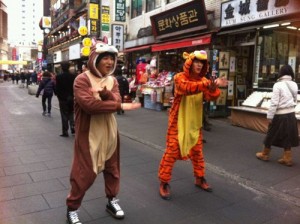 While these topics are some of the more reoccurring in idol variety, the topics aren’t limited to the ones listen above. Actually, despite the risk of lack of material or organization, some shows really just focus on the idols’ daily lives. Rookies’ (pre-)debut documentaries such as Tadah! It’s B.A.P. don’t really follow a concept other than introducing members. Furthermore, shows like MBLAQ‘s and Infinite’s Sesame Player are hard to categorize as well, as they just show the idols’ daily antics. While planning an end or activities for these shows may be harder, if done right with the right cast of idols, these shows can be entertaining on their own.
While these topics are some of the more reoccurring in idol variety, the topics aren’t limited to the ones listen above. Actually, despite the risk of lack of material or organization, some shows really just focus on the idols’ daily lives. Rookies’ (pre-)debut documentaries such as Tadah! It’s B.A.P. don’t really follow a concept other than introducing members. Furthermore, shows like MBLAQ‘s and Infinite’s Sesame Player are hard to categorize as well, as they just show the idols’ daily antics. While planning an end or activities for these shows may be harder, if done right with the right cast of idols, these shows can be entertaining on their own.
But as I said, not all groups can really be as amusing to fill up an entire show on their own, and TV stations need material to air. And also, with more and more idol groups appearing and more and more of them getting shows, the shows need a bit of a distinction to attract a viwership, meaning daily banter would not be enough. Actually, shows are now featuring more than one idol group, such as B1A4 and Block B‘s Match Up, and while it may attract more viewers, it limits each group’s airtime. As such, plain group documentaries are a risk for TV stations to air, leaving the option of a concept all the more inviting.
 And other than attracting a viewership, when planned right, these variety concepts can actually coincide with a group’s musical concept. SNSD’s Dangerous Boys variety worked really well with the message of “The Boys,” as the song’s lyrics talked about motivating boys to get up and live life, much like the focus of the show. Other than the fashion, this variety was one of my favorite things about the concept as it thematically matched the song even better than the misleading girl power teasers.
And other than attracting a viewership, when planned right, these variety concepts can actually coincide with a group’s musical concept. SNSD’s Dangerous Boys variety worked really well with the message of “The Boys,” as the song’s lyrics talked about motivating boys to get up and live life, much like the focus of the show. Other than the fashion, this variety was one of my favorite things about the concept as it thematically matched the song even better than the misleading girl power teasers.
But when untimely planned or wrongly casted, it may be hard to take the show or the idols’ themselves seriously. Take for example, it wouldn’t be timely for a group to do a Hello Baby stint while promoting a song about living a carefree life as a bachelor/bachelorette. And personally, while it may be a minor example, I found it quite amusing and ironic when I heard Super Junior would be promoting a song titled “Sexy, Free, and Single” with Leeteuk in a virtual marriage with Kang Sora.
So ultimately, with their increasing relevance even in K-variety, once again, the importance of concepts prove to be extremely evident in the K-pop sphere, particularly in the idols’ side of things. Being the base, core, or main idea of an effort, concepts help set guidelines in conduct and organization, and when handled right, concepts can add to the overall cohesiveness in a comeback or debut. So what do you think Seoulmates? Are there any concepts or trends in variety that you’ve noticed? And what do you think about concepts in variety in general? Your input is always gladly appreciated!
(SM Entertainment, Woollim Entertainment, SBS, KBS, MBC, M.Net, JTBC, snsdlyrics)
